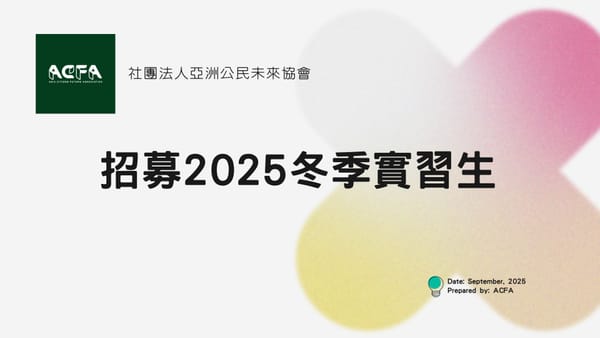Series 4|No WiFi, No Rights! "Cross-Regional Initiatives and Solidarity Building: The Example of ‘Wifi Now for Fishers’ Rights’ Campaign"

Event Information
- Date:2024/7/18
- Time : 19:00-21:00
- Location : Online meeting room (Link will be provided in the confirmation e-mail before the event)
- Language: English with Mandarin Interpretation Assistance
- Registration:https://forms.gle/fijnsGUdWPWUUEbz6
Under the influence of rapid globalization, migrant workers have become an important community that contribute to economies around the world. Particularly, remittance of the migrant workers became an important pillar of Southeast Asia’s economic development. However, the migrant workers are also marginalized in many societies and omitted from social safety net and human rights protection, thus facing increasing vulnerabilities in foreign countries.
Despite the difficulties they face, migrant workers communities still develop labors rights movements and organizations, and build transnational and cross-regional solidarity and initiatives with various human rights and labor organizations. ‘Wifi Now For Fishers’ Rights’, for example, is an important international campaign for migrant workers rights in Taiwan.
This event invites Taiwan and Southeast Asian labor rights and human rights activists to discuss how migrant workers build their social movement while facing discrimination in aspects of social classes, capitals, races, and nationalities. Furthermore, it also delves into how these civil society members, through understanding migrant workers’ agency, build cross-regional solidarity and collaboration to advocate for migrant workers’ rights.
Speakers
Yi-hsiang Shih, the current Senior Researcher of the Taiwan Association for Human Rights, was enlightened in 2005 when he went to the Philippines to conduct a fact-finding mission on the human rights massacre at Hacienda Luisita. He has been working as a human rights worker for more than ten years now. Issues he focuses on include transitional justice, international human rights conventions, migrant workers and foreign fishermen, and Human Rights Responsibilities of Businesses.
Lennon Ying-Da Wang is the director in the department of policies on migrant workers in Serve the People Association (SPA), a labor organization in Taiwan. Lennon has been dedicated to migrant workers’ rights for more than 20 years. He established a labor union and provided asylum for migrant workers
Daniel Awigra is a human rights activist and the Executive Director of Indonesia's NGO Coalition for International Human Rights Advocacy or Human Rights Working Group (HRWG; www.hrwg.or.id). He has served as the International Advocacy Presidium of Jaringan Buruh Migran since 2015. He co-founded Journalist Association for Diversity (SEJUK; sejuk.org) in 2008.
Series Talk Introduction
The concept of ‘stretching’ is a contrast to the concept of ‘shrinking’. ‘Stretching Exercise’ symbolizes the continuous activism and organizing of Southeast Asian civil society organizations, movements, and human rights defenders amid the shrinking of civic space and repressive restrictions despite knowing the price for their activism. Their activism ensembles the warm-ups and stretching exercises, which are mild, but extends and defends the existing civic space. Such activism, in the context of shrinking civic space, maintains their momentum, and is very active and innovative.
Asia Citizen Future Association (ACFA) is dedicated to connect Taiwan and Southeast Asian civil society to develop collective strategies to defend civic space. Through the four events in the series, “Stretching Exercise: Defend Civic Space in Southeast Asia”, ACFA invites more than 10 speakers from Indonesia, Philippines, Thailand, Malaysia, Taiwan, and a Southeast Asian regional organization, to discuss how organizations and activists working on various issues continue their work and push for human rights developments through local, regional, cross-regional collaborations and cross-cutting strategies.




